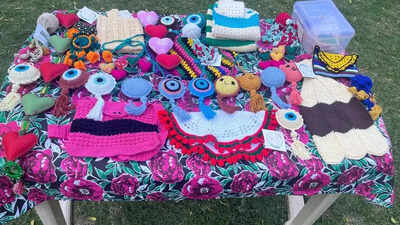- News
- City News
- noida News
- Darkness to light: A normal life that didn’t seem possible
Trending
Darkness to light: A normal life that didn’t seem possible
Noida: Then 16, Meena found herself in a world without windows at Delhi's GB Road in 2005. She would wake up to darkness and fall asleep to the echo of footsteps in the corridor — men coming and going.
Forced into sex work, she was confined to a few square feet where sunlight never reached. Windows, after all, were for those who had choices.
But light did eventually find its way, through the narrowest cracks, after she was rescued and brought to Dream Village, a shelter for former sex workers set up by an NGO — Kat-Katha — in a Noida banquet hall that shut down in 2020.
For the first time in 20 years, Meena says she slept on a clean bed at Dream Village. Waking up to sunlight and trees is a "privilege" she didn't think she would have. She and 13 other ‘didis' — as the women are called at the shelter — care for a garden, prepare meals together and gather in the evenings to learn about each other's daily lives. They value ordinary, uneventful days because such calm felt impossible on GB Road.
She plans to start her own tailoring business someday. "I want to earn with my own hands, not my body."
Many other women, like Meena, arrived at Dream Village after they were coerced into sex work as teenagers or even younger. They found confidence in stitching cloth bags, crocheting stuffed toys, practising embroidery and running a catering service.
An ‘idle' banquet hall
The shelter, which offered many women their first experience of safety, once operated as a banquet hall. This shuttered venue might have fallen into disuse during the pandemic, but it became an opportunity for Gitanjali Babbar, Kat-Katha's founder.
For over 10 years, Kat-Katha educated and mentored women from GB Road, offered them vocational training, and provided counselling. At every step, it emphasised the possibility of a better life beyond the brothels.
The Noida shelter stands as the culmination of that decade-long effort. "Landlords shut their doors on us repeatedly. They imagine we are dangerous and will destroy their neighbourhood simply by existing," says Babbar.
A retired Army veteran, who knew Babbar's mentor, unexpectedly stepped in. He allowed Kat-Katha to lease the abandoned hall at a modest rate. "The owner wanted to sell the land after shutting it down in 2020. When he couldn't secure the right price, my mentor suggested he lease it to Kat-Katha," Babbar recollects. "But the land is worth Rs 25 crore. He could sell it at any point. We are searching for another place to move," she adds.
Two's a team
Escaping GB Road is almost unimaginable for most women there, and it is even rarer for their children. Yet Priya (18) and Simran (16), born into that environment, became the first residents of Dream Village, says Pragya, the shelter's project coordinator.
"Priya and Simran's mother fought hard. Brothel managers threatened her, but she refused to let her daughters be trapped," Babbar tells TOI. It was around 10 years ago that the sisters joined Kat-Katha's bridge school. Priya now studies political science at Azim Premji University in Bhopal and Simran is preparing for her Class 12 boards. Their mother has moved out of GB Road to rent a small room in Delhi.
Lessons unlearned and learned
Upon reaching Dream Village, several women did not know the basics of personal care or hygiene. "We had to teach them simple routines — like bathing and brushing their teeth. They invested so much energy in appearing attractive for customers that they never learned how to care for themselves properly," Pragya explains.
Arti, trafficked from Rajasthan at the age of 10, only discovered that she had never handled day-to-day cooking when she arrived at Dream Village. "I didn't even know how to cook rice," she says.
Most women at Dream Village devote their days to learning skills such as stitching, embroidery and cooking. They collect katran (fabric scraps donated by nearby tailoring units) to make mats, tote bags, T-shirts and bedsheets. These goods appear at exhibitions and in online stores, allowing the women to earn an income.
A few of them trained in catering. "We make mathri, namak pare, gur pare, besan laddoo, pav bhaji, sambhar dosa, etc," says Jyoti (31), who left GB Road with her 12-year-old daughter, who now attends a school nearby.
But securing her daughter's release needed a fight. "When I decided to leave GB Road, the brothel manager said I could go, but I had to leave my daughter behind. The place reeked of alcohol and violence. It was no environment for a child," she recollects.
Challenges stay on
Even after they leave, the women wrestle with challenges. Donations arrive, but they do not always cover ongoing expenses for health check-ups and counselling. Many women also require therapy after enduring years of exploitation.
Their commercial ventures face inconsistent demand. "Most of our sales come from other NGOs that want to support us. Otherwise, we try to set up booths at events in Delhi," says Meena. They also fear losing the only home they know now. The hall's owner might sell it at any time, and Kat-Katha does not have a permanent site for Dream Village.
A hope for others
Dream Village, meanwhile, has ignited hopes among thousands of women in 74 brothels of GB Road. "Many want to leave. But they think nobody will accept them," Arti rues.
These women are rebuilding their lives with each stitch of thread, each home-cooked meal and every ordinary day lived without fear. After all, they no longer live in a house without windows.
(All names have been changed on the women's requests)
End of Article
FOLLOW US ON SOCIAL MEDIA









